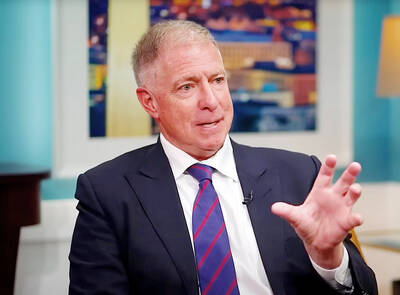Saint Mary’s Hospital Luodong (SMHL) drew attention to the lack of proper medical care for Taiwan’s rapidly growing elderly population on the eve of the Double Ninth Festival yesterday, which falls on the ninth day of the ninth lunar month, calling for a more secure and friendly environment for elderly people.
Citing statistics released by the Ministry of the Interior, SMHL superintendent Chen Yung-hsing (陳永興) said that with Taiwan experiencing the fastest aging population in the world, the number of elderly people in need of care has increased three-fold in the past 13 years.
“However, only 3.9 percent of them are receiving decent nursing care from specialized institutions, while the majority — 600,000 elderly people — are left unattended,” Chen said.
Comparing Taiwan with European countries in the area of medical care, Chen said the country trailed far behind Sweden, Germany and England, where 30 percent of their elderly population are properly attended in care organizations and 70 percent through community care.
The Council for Economic Planning and Development has forecast that Taiwan will enter a “super-aging society” — defined as countries with more than 20 percent of their total population aged 65 or older — in 2025, Chen said.
“While it may take 24 years for the percentage of Japan’s elderly population to reach the benchmark of 20 percent, Taiwan is predicted to take only 22 years to do that,” Chen said, casting doubt on whether the country is prepared for the “coming tsunami in aging.”
Submitting a three-point appeal for better care for elderly citizens, whether at hospitals, long-term care facilities or at home, Chen called for “medical care, nursing care and rearing for the elderly.”
Senior Citizen’s Welfare Foundation director Lee Hui-mei (李惠美) attributed the lack of proper medical care to a shortage of nursing personnel, 60 percent of long-term care institutions not being up to standard and only 5 percent of nursing facilities meeting the criteria for being elderly-friendly.
“The SMHL is in the midst of raising funds for the construction of an elderly-friendly medical building, in the hope of providing a friendly medical environment that meet the demands of our elderly citizens,” Chen said.

The Grand Hotel Taipei on Saturday confirmed that its information system had been illegally accessed and expressed its deepest apologies for the concern it has caused its customers, adding that the issue is being investigated by the Ministry of Justice Investigation Bureau. The hotel said that on Tuesday last week, it had discovered an external illegal intrusion into its information system. An initial digital forensic investigation confirmed that parts of the system had been accessed, it said, adding that the possibility that some customer data were stolen and leaked could not be ruled out. The actual scope and content of the affected data

A New York-based NGO has launched a global initiative to rename the nation’s overseas missions, most of which operate under the name "Taipei," to "Taiwan Representative Office (TRO)," according to a news release. Ming Chiang (江明信), CEO of Hello Taiwan, announced the campaign at a news conference in Berlin on Monday, coinciding with the World Forum held from Monday through Wednesday, the institution stated in the release. Speaking at the event, Democratic Progressive Party Legislator Huang Jie (黃捷) said she believed this renaming campaign would enable the international community to see Taiwan

DEFENSE: The US should cancel the US visas or green cards of relatives of KMT and TPP lawmakers who have been blocking the budget, Grant Newsham said A retired US Marine Corps officer has suggested canceling the US green cards and visas of relatives of opposition Taiwanese lawmakers who have been stalling the review of a proposed NT$1.25 trillion (US$39.7 billion) special defense budget. The Executive Yuan has proposed the budget for major weapons purchases over eight years, from this year to 2033. However, opposition lawmakers have refused to review the proposal, demanding that President William Lai (賴清德) first appear before the Legislative Yuan to answer questions about the proposed budget. On Thursday last week, 37 bipartisan US lawmakers sent a letter to Legislative Speaker Han Kuo-yu (韓國瑜), the heads

DO THEY BITE IT? Cats have better memories than people might think, but their motivation is based entirely around the chance of getting fed Cats can remember the identity of the people who fed them the day before, Taipei-based veterinarians said on Friday, debunking a popular myth that cats have a short memory. If a stray does not recognize the person who fed them the previous day, it is likely because they are not carrying food and the cat has no reason to recognize them, said Wu Chou Animal Hospital head Chen Chen-huan (陳震寰). “When cats come to a human bearing food, it is coming for the food, not the person,” he said. “The food is the key.” Since the cat’s attention is on the food, it